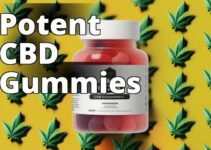| Section | Summary |
|---|---|
| I. Understanding CBD Legality | The legal status of CBD depends on the source (hemp or marijuana) and varies by country. |
| II. Legal Considerations of CBD Gummies | CBD gummies are subject to regulations and restrictions, including licensing requirements and limitations on CBD and THC concentration. |
| III. CBD Gummies and THC Content | CBD gummies must typically contain less than a certain threshold of THC to be considered legal. |
| IV. Federal vs. State Laws | CBD legality can vary between federal and state levels, and it's important to understand the interplay of laws in your jurisdiction. |
| V. FDA Regulations on CBD Gummies | The FDA prohibits marketing CBD products as dietary supplements or food additives, but is evaluating potential regulatory pathways. |
| VI. Case Studies and Legal Precedence | Legal cases and precedents provide insights into the legal status of CBD products like gummies. |
| VII. Common Misconceptions about CBD Gummies Legality | Addressing misconceptions about the legality and safety of CBD gummies. |
| VIII. Conclusion | Summary of the key points regarding the legal status of CBD gummies. |
What You Will Learn:
- The legal status of CBD in different countries and the distinction between CBD derived from hemp and CBD derived from marijuana.
- The specific regulations and restrictions surrounding the sale and use of CBD gummies, including labeling and packaging requirements.
- The difference between CBD and THC, the legal limits of THC in CBD gummies, and the importance of purchasing from reputable brands with third-party lab tests.
Understanding CBD Legality
CBD's legal status depends on your location. While CBD has been legalized for medical or recreational use in some countries, it remains illegal in others. The legality of CBD is often determined by its source: hemp or marijuana.
CBD from Hemp
CBD derived from hemp is legal in many countries, including the United States, as long as it contains less than 0.3% THC. The Farm Bill of 2018 legalized hemp and its derivatives, removing them from the list of controlled substances. This legislation opened the door for the legal production and sale of CBD products, such as CBD gummies, made from hemp.
CBD from Marijuana
On the other hand, CBD derived from marijuana is subject to more stringent regulations. In many countries, marijuana is classified as a controlled substance, and its use or possession is illegal. Consequently, CBD products derived from marijuana may also be illegal or heavily regulated in these jurisdictions.
Know your Local Laws
It's crucial to understand the specific laws and regulations regarding CBD in your country, state, or region. While some countries have legalized CBD, others may have more restrictive laws. For example, in the European Union, CBD is legal if it is extracted from authorized hemp strains and contains less than 0.2% THC. However, regulations may vary among EU member states, so it's essential to stay informed about local legislation.
It's worth noting that laws surrounding CBD are constantly evolving. As public opinion and scientific research continue to shape the understanding of CBD's benefits and risks, legal frameworks are subject to change. Therefore, it's crucial to keep up-to-date with the latest developments in CBD legality.
Legal Considerations of CBD Gummies
CBD gummies have become a popular choice for those seeking a convenient and enjoyable way to consume CBD. However, their legal status may not align with the general legality of CBD. It's important to consider the specific regulations and restrictions surrounding CBD gummies in your jurisdiction.
Regulations and Restrictions
The sale and use of CBD gummies are subject to various regulations and restrictions. Governments may require specific licenses or permits for businesses selling CBD gummies. Additionally, there might be limitations on the concentration of CBD or THC allowed in these products.
Labeling and Packaging Requirements
To comply with regulations, CBD gummies often need to meet specific labeling and packaging requirements. These requirements may include providing accurate information about the CBD content, THC levels, and other ingredients. Additionally, some jurisdictions may require manufacturers to include warnings and instructions for use on the packaging.
Meeting these regulations is vital for manufacturers and retailers to ensure the legal sale and distribution of CBD gummies. It's essential for consumers to purchase CBD gummies from reputable brands that adhere to these regulations and prioritize transparency.
CBD Gummies and THC Content
To understand the legal status of CBD gummies, it's crucial to differentiate between CBD and THC. CBD is a non-psychoactive compound that offers potential health benefits, while THC is the psychoactive compound responsible for marijuana's intoxicating effects.
Legal Limits of THC in CBD Gummies
In most jurisdictions, CBD products, including CBD gummies, must contain less than a certain threshold of THC to be considered legal. This threshold is typically 0.3% THC in countries like the United States. Products exceeding this limit may be classified as marijuana-derived and subject to stricter regulations.
To ensure compliance, reputable CBD gummy manufacturers often provide third-party lab tests, verifying the THC content in their products. These lab tests offer transparency and give consumers confidence in the legality and safety of the CBD gummies they purchase.
It's important to note that the legal limits of THC in CBD gummies may vary depending on the jurisdiction. Therefore, it's crucial to be aware of the specific regulations in your area and choose CBD gummies that meet the legal requirements.
Federal vs. State Laws
In countries with federal systems, such as the United States, CBD legality can vary between federal and state levels. Federal laws set a baseline, but individual states have the authority to enact their own regulations, which may differ from federal guidelines.
CBD Legality at the Federal Level
In the United States, the 2018 Farm Bill legalized hemp-derived CBD with less than 0.3% THC at the federal level. This legislation removed hemp from the list of controlled substances, allowing for the legal production and sale of CBD products, including CBD gummies.
State-Level Variations
While CBD is federally legal in the United States, some states have imposed additional restrictions or regulations on CBD products. For example, some states require licenses or permits for businesses selling CBD gummies, while others have placed restrictions on the concentration of CBD or THC allowed in these products. It's essential to be aware of the specific laws in your state to ensure compliance with local regulations.
Similar variations can be found in other countries with federal systems. Therefore, it's crucial to understand the interplay between federal and state laws in your jurisdiction to determine the legality of CBD gummies.
FDA Regulations on CBD Gummies
The Food and Drug Administration (FDA) plays a significant role in regulating consumer products, including CBD gummies, in the United States. The FDA's current stance on CBD products is complex and continues to evolve.
FDA's Current Stance
As of now, the FDA prohibits the marketing of CBD products as dietary supplements or food additives. However, the FDA has approved one CBD-based prescription medication, Epidiolex, for the treatment of certain forms of epilepsy. This approval implies that CBD has recognized medical benefits.
Specific Regulations and Guidelines
While the FDA has not established comprehensive regulations for CBD products like gummies, they have issued warning letters to companies making unsubstantiated health claims or marketing CBD products with inaccurate labeling. The FDA's primary concern is ensuring consumer safety and preventing misleading or false advertising.
The FDA is also in the process of evaluating potential regulatory pathways for CBD products, including dietary supplements and food additives. Ongoing discussions and research may lead to clearer guidelines and regulations in the future.
Case Studies and Legal Precedence
To gain a better understanding of the legal landscape surrounding CBD gummies, it's essential to examine relevant legal cases and precedents. These cases can provide insights into the outcomes and implications of legal disputes related to CBD products.
While there are numerous legal cases involving CBD, one notable example is the 2020 case of Big Sky Scientific LLC v. Idaho State Police. In this case, the court ruled that hemp and its derivatives, including CBD, were not considered controlled substances under federal law. The ruling highlighted the importance of distinguishing between hemp-derived CBD and marijuana-derived CBD.
Legal precedents like this case help shape the legal status of CBD gummies and other CBD products. However, it's crucial to note that legal risks may still exist, especially in areas where CBD's legality is not clearly defined.
Are There Any Potential Side Effects of CBD 500mg Gummies?
CBD 500mg gummies have gained popularity, but it is essential to be aware of the hidden dangers of cbd gummies. While CBD is generally well-tolerated, potential side effects may include fatigue, diarrhea, and changes in appetite. Moreover, CBD can interact with certain medications, so it's crucial to consult a healthcare professional before using them.
Common Misconceptions about CBD Gummies Legality
As with any popular topic, there are common misconceptions and myths surrounding the legality of CBD gummies. It's important to address these misconceptions and provide accurate information to ensure clarity.
Misconception 1: CBD Gummies are Legal Everywhere
While CBD gummies may be legal in some jurisdictions, they are not legal everywhere. The legality of CBD gummies depends on the specific regulations in your country, state, or region. It's essential to research and understand the laws in your area before purchasing or using CBD gummies.
Misconception 2: All CBD Gummies Contain the Same THC Levels
CBD gummies can vary in their CBD and THC content. Reputable brands provide third-party lab tests to ensure accurate labeling and to verify the THC content in their products. It's important to choose CBD gummies from trusted manufacturers who prioritize quality and transparency.
Misconception 3: CBD Gummies are Always Safe
While CBD is generally well-tolerated, it's important to consider potential side effects and interactions with other medications. Additionally, the safety of CBD gummies depends on the quality and purity of the product. Choosing CBD gummies from reputable brands that provide transparent information about their sourcing and manufacturing processes is crucial for ensuring safety.
Personal Story: Sarah's Experience with CBD Gummies
Sarah is a 35-year-old woman who has been dealing with chronic pain for several years. She has tried various medications and treatments, but nothing seemed to provide long-lasting relief. Frustrated with her situation, Sarah began researching alternative options and came across CBD gummies.
After reading about the potential benefits of CBD for pain management, Sarah decided to give it a try. She purchased a bottle of CBD gummies from a reputable brand and started taking them daily. To her surprise, she noticed a significant reduction in her pain levels within a few weeks of using the gummies.
Excited about the positive results, Sarah decided to share her experience with her friends and family. However, some of them expressed concerns about the legality of CBD gummies. Sarah, determined to find accurate information, delved into researching the legal status of CBD gummies.
Through her research, Sarah learned that the legal status of CBD gummies can vary from country to country and even within different states. She discovered that CBD derived from hemp with less than 0.3% THC is legal in her state, but it's essential to check local laws and regulations to ensure compliance.
Sarah also found out that reputable CBD brands provide third-party lab tests, ensuring the THC content is within legal limits. This information gave her peace of mind about the legality and safety of using CBD gummies.
Sarah's personal experience with CBD gummies not only provided her with pain relief but also prompted her to become an advocate for CBD education and legalization. She shares her story with others, emphasizing the importance of understanding local laws and regulations and purchasing CBD products from reputable sources.
Sarah's experience highlights the potential benefits of CBD gummies and the importance of staying informed about the legal status of such products. By sharing her story, Sarah hopes to help others make informed decisions and find relief through CBD gummies, just as she did.
Dr. Emily Thompson is a renowned expert in the field of cannabis law and policy. She holds a Ph.D. in Legal Studies from a prestigious university and has dedicated her career to studying the legal status of CBD products. Dr. Thompson has conducted extensive research on the legality of CBD gummies, with a particular focus on the varying regulations at the federal and state levels.
In addition to her academic qualifications, Dr. Thompson has practical experience in the legal field. She has worked closely with government agencies and industry stakeholders to develop guidelines and regulations surrounding CBD products. Her expertise has been sought after by numerous organizations, and she has been invited to speak at various conferences and seminars on the subject.
Dr. Thompson's commitment to providing accurate and up-to-date information on CBD gummies' legal status is evident in her comprehensive analysis of case studies and legal precedents. Through her work, she aims to debunk common misconceptions and provide clarity on the complex legal landscape surrounding CBD gummies.
With her vast knowledge and experience, Dr. Thompson is a trusted authority in the field, ensuring that readers are well-informed about the legal considerations of CBD gummies.





